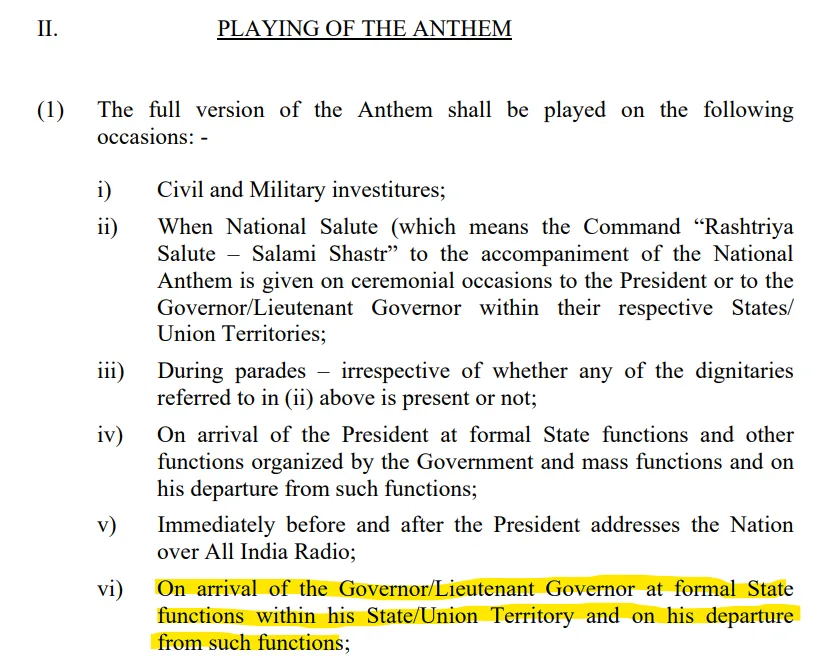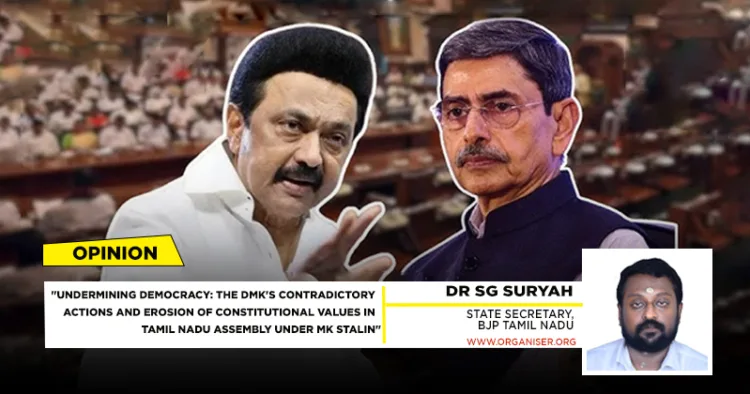The Dravida Munnetra Kazhagam (DMK), a political party with a prominent history in Tamil Nadu, has often claimed to champion state autonomy and social justice. However, recent developments in the Tamil Nadu Legislative Assembly suggest that the party’s actions contradict the constitutional principles it ostensibly upholds. Under the guise of promoting state autonomy, the DMK appears to be subtly advancing a divisive agenda reminiscent of its pre-1962 policies. From curtailing opposition rights to pushing contentious resolutions, the party’s conduct raises serious concerns about the erosion of constitutional values in the state.
The recent conflict between the DMK government and the Governor in the Assembly over the singing of the national anthem serves as yet another reminder of the divisive origins of the DMK party. On January 6, Tamil Nadu Governor R.N. Ravi was compelled to walk out of the Assembly for the third consecutive year due to the national anthem not being played at the commencement of the first session, despite his explicit request. A similar incident occurred in February 2024, underscoring the DMK’s apparent disregard for constitutional conventions.
In 2023, Governor Ravi openly criticized the state government’s approach, refusing to deliver the speech prepared for him by the DMK government. He described the content as inaccurate, propagandistic, and lacking substance on policies or programs. “The speech was neither about governance nor policies—it was filled with lies and propaganda,” the Governor remarked.
The DMK attempts to justify its actions by citing a long-standing convention in the Tamil Nadu Assembly, where the Tamil Thaai Vaazhthu (state anthem) is sung at the start of the session, and the national anthem is reserved for the end. However, this issue goes beyond mere conventions. The Ministry of Home Affairs, Government of India, has laid down a clear standard operating procedure outlining the specific occasions when the national anthem must be sung for events attended by the constitutional authorities.
MHA Guidelines on National Anthem
Chapter 2 (Playing of Anthem), Section 1.6 of the Ministry of Home Affairs’ Orders on the National Anthem of India states, “The full version of the Anthem shall be played on the following occasions: on the arrival of the Governor/Lieutenant Governor at formal State functions within their State/Union Territory and on their departure from such functions.” This provision clearly indicates that the DMK government has violated the prescribed guidelines of the Ministry of Home Affairs.

Governor Ravi’s walkout from the Tamil Nadu Assembly over the disrespect shown to the national anthem served another purpose: sparing the people of Tamil Nadu from hearing an address filled with falsehoods and inaccuracies.
Amid the arrest of DMK functionary Jaffer Sadhik, the kingpin of a major drug mafia responsible for devastating the lives of millions of youths, the Governor’s address prepared by the DMK government ironically included the statement: “This government continues to have a zero-tolerance approach towards drugs and narcotics. Through frequent raids, special anti-drug drives, awareness campaigns, and enhanced border checkposts, the government has been making all efforts to curb this menace.”
Another statement in the address reads, “The government’s dedication to safety and security has significantly contributed to increased employment opportunities for women.” This assertion comes at a time when DMK functionary Gnanasekaran was arrested for the rape of an Anna University student, sparking widespread protests across Tamil Nadu demanding the arrest of other accused individuals behind the DMK functionary.
Tampering Live Telecast of Assembly Sessions
These are not the only instances where DMK government has killed the constitution inside the Tamil Nadu assembly. In protest against the rape incident at Anna University, members of the AIADMK wore black shirts with badges reading “Who is that sir?” during the assembly session, to draw attention to the fact that another individual linked to the case had not yet been arrested. In response to this protest, the DMK government adopted a controversial approach during the 2025 Assembly session by restricting live broadcasts to only DMK and allied members’ speeches.
For the rest of the proceedings, the telecast displayed a blank screen with the message “Tamil Nadu Legislative Assembly Session 2025,” along with the government logo and an image of the assembly building. The broadcast resumed only when DMK and alliance MLAs were speaking, effectively excluding the voices of the opposition.
In a similar incident, during the Assembly session following the Kallakurichi hooch tragedy, which claimed over 50 lives, the cameras were intentionally focused on DMK MLAs and ministers while opposition members spoke, effectively diminishing their visibility in the broadcast. It was alleged that the microphones of opposition leader Edappadi Palanisamy were muted, with his audio being cut from the live telecast. AIADMK leaders and supporters accused Speaker Appavu of employing such tactics whenever the DMK government came under scrutiny or faced challenges inside assembly.
Confessions and Contradictions:
Chief Minister Stalin has earned a reputation for frequently contradicting his own or his party’s positions inside the assembly on various issues. Despite images of the accused with DMK leaders going viral, party leaders attempted to distance themselves from him. BJP leader Annamalai and AIADMK leaders labelled Gnanasekaran as a DMK functionary. Initially, DMK leaders denied any connection to the accused, but MK Stalin has now stated in the Assembly that Gnanasekaran is a DMK supporter, not a functionary. This statement directly contradicted the party’s earlier stance, which had firmly denied any ties with the accused.
In another such incident of contradicting himself regarding the assembly proceedings, Chief Minister Stalin, who now insists that Governor Ravi read verbatim the address prepared by the DMK government, had previously, while serving as the opposition leader, opposed then-Governor Banwarilal Purohit reading verbatim the address prepared by the AIADMK government. At that time, Stalin walked out of the Assembly, citing the same reason. During 2023 Governor’s address, RN Ravi refused to read that Tamil Nadu is a “heaven of peace,” citing instances of violence in the state, including petrol bomb attacks after the PFI ban, the Coimbatore car bomb blast, and the Kallakurichi incident where over 5000 people burned down a school. Governor RN Ravi said, “Now, with all this happening, you ask me to say it is a ‘haven of peace’. I am oathbound to tell the people of Tamil Nadu the truth.” At that time, however, CM Stalin and other DMK ministers insisted that it was the Governor’s duty to read the speech prepared by them verbatim.
On January 7, 2020, the same Stalin, who was then the opposition leader, boycotted the assembly and remarked, “I skimmed through all the 56 pages of the Governor’s address. There is nothing worth mentioning in it. The Governor has only read the eulogy written by Chief Minister Edappadi K Palaniswami. This is not the Governor’s address, but the ruling party’s address. It is a comic speech. Stop converting the House into a drama stage.”
Giving contradictory statements in assembly is not a recent occurrence for MK Stalin. On May 5, 2022, less than a year after becoming Chief Minister, Stalin made conflicting remarks regarding the lockup murder of a Scheduled Caste youth. Chief Minister Stalin’s statements in the Assembly on Vignesh’s custodial death contradicted the FIR and eyewitness accounts. While Stalin echoed the police’s version, which omitted mention of Vignesh’s injuries, the FIR recorded significant injuries on Vignesh’s body before he was taken to the police station. The post-mortem report also revealed multiple injuries, including a fractured leg and facial injuries, which were absent from the CM’s narrative. Eyewitness Prabhu, who had driven the auto, contradicted the police’s claim, stating that Vignesh showed no signs of injury when picked up. This discrepancy raises serious questions about the government’s handling of the case.
Conclusion
In conclusion, the actions of the Dravida Munnetra Kazhagam (DMK) government in Tamil Nadu raise critical concerns regarding its commitment to upholding constitutional principles. While the party claims to champion state autonomy and social justice, recent events, including its approach to the national anthem, manipulation of Assembly proceedings, and contradictions in public statements, highlight a troubling pattern of undermining democratic values. The disregard for established protocols, the silencing of opposition voices, and the distortion of truth in official addresses all point to a troubling erosion of the rule of law and constitutional integrity in the state. These developments serve as a stark reminder that when political parties prioritize their own agenda over transparency and accountability, the very foundations of democracy are at risk.
The author Dr.SG Suryah is State Secretary, BJP Tamilnadu



















Comments